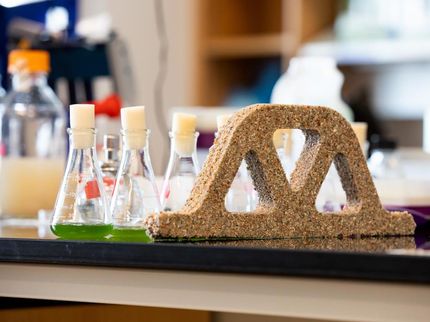Scientists devise artificial intestine to help engineer disease-fighting gut bacteria
Cornell professor John March is attempting to transform bacteria in our gut into disease-fighting machines. Now, thanks to two members of his research team, he has a powerful new tool to help him do so: an artificial intestine. The research was published in Lab on a Chip.
The 3-D hydrogel scaffolds developed by graduate student Jiajie Yu and former postdoctoral researcher Jong Hwan Sung will allow scientists to grow cells under realistic physiological conditions, an important breakthrough. Until now, they have had to rely on two-dimensional cultures or live animal models.
"We knew the flat models weren't accurate. Cells behave differently in different three-dimensional environments," said March, an assistant professor of biological and environmental engineering at the College of Agriculture and Life Sciences. "This will enable us to better study drug absorptions and interactions between epithelia and bacteria in the intestine."
Yu and Sung created a hard plastic mold, then covered it with a softer so-called sacrificial mold made from calcium alginate that could be dissolved, leaving a collagen scaffold upon which live cells could be grown.
In this way, they avoided damaging the delicate shapes during separation of the molds. And the method does not use expensive or complicated equipment required by most microfabrication methods -- it can be carried out on a common lab bench or a sterilized biosafety cabinet.
The researchers tested the model by seeding it with human colon carcinoma cells. After being cultured for three weeks, it was covered with fingerlike structures mimicking the intestinal villi, the threadlike projections covering the surface of the mucous membrane in the small intestine where fluids and nutrients are absorbed.
All this was done on a tiny scale, about 1mm high and 200 microns across, visible under a scanning electron microscope. March said scientists had previously managed to fabricate models as small as 1 or 2 microns, but slightly larger sizes - especially those with tricky aspect ratios or curvature - have eluded them.
Most read news
Other news from the department science

Get the life science industry in your inbox
By submitting this form you agree that LUMITOS AG will send you the newsletter(s) selected above by email. Your data will not be passed on to third parties. Your data will be stored and processed in accordance with our data protection regulations. LUMITOS may contact you by email for the purpose of advertising or market and opinion surveys. You can revoke your consent at any time without giving reasons to LUMITOS AG, Ernst-Augustin-Str. 2, 12489 Berlin, Germany or by e-mail at revoke@lumitos.com with effect for the future. In addition, each email contains a link to unsubscribe from the corresponding newsletter.






















































